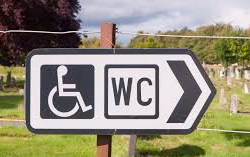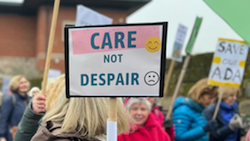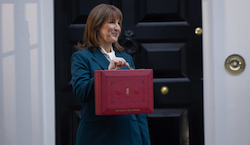As lockdown eases many disabled people remain excluded from public space due to lack of accessible public toilets. Local authorities should have a statutory duty to provide appropriate facilities for all, say DEREK BELL, MARY HULL, LIBBY MORRISON and JANICE MCLAUGHLIN.
As Covid-19 moves from the trauma and immense challenge of the pandemic at its peak, to an uncertain future of living with the virus, local and national government and communities are beginning to re-design public spaces to limit the risk of infection and secure social distancing.
 One ‘obvious’ way to do this is not to re-open public toilets. However, as with other responses to Covid-19, this ‘obvious’ approach will bring significant problems for disabled people and carers who rely on being able to use accessible public toilets to participate in society.
One ‘obvious’ way to do this is not to re-open public toilets. However, as with other responses to Covid-19, this ‘obvious’ approach will bring significant problems for disabled people and carers who rely on being able to use accessible public toilets to participate in society.
If this issue is not factored into design, disabled people and carers will – yet again – be designed out of society.
Who needs toilets?
Before Covid-19 the UK did not have sufficient publicly accessible toilets to meet the needs of its population. Austerity measures over the last 10 years have seen a significant reduction in the provision of local authority funded toilets. This is because there is no statutory requirement on local authorities to provide them.
While everyone needs toilets, some need them more often and some need them to be more accessible and designed with their needs in mind. This includes 14 million people who have some form of impairment, including 1.2 million wheelchair users, 700,000 who are autistic and two million with a visual impairment.
In addition, crucially, there are also 14 million people who have urinary incontinence and 6.5 million who experience bowel incontinence – 130,000 of whom have a stoma. Older people are more likely to have health needs or to experience incontinence, and almost a million are likely to care for someone else – often someone with dementia.
As we emerge from lockdown, there is a real risk that these people have to extend their self-isolation due to lack of adequate toilet provision in public spaces.
Commercial and community toilets
As local authorities have reduced provision, people have come to rely more and more on toilets in commercial spaces – shops, cafes, cinemas, and so on. In Newcastle, for example, there are no publicly funded toilets.
 Indeed, local authorities have encouraged commercial spaces, via Community Toilet or Use our Loos schemes, to open their toilets for general use and this has become a primary solution to public toilet provision.
Indeed, local authorities have encouraged commercial spaces, via Community Toilet or Use our Loos schemes, to open their toilets for general use and this has become a primary solution to public toilet provision.
However, it is these commercial businesses, which so many rely on, that are most affected by the lockdown restrictions on movement. Even as these venues re-open it is likely that cost and risk of infection will prevent many from opening their toilets, or at least will restrict their availability.
As the ‘death of the high street’ becomes a reality, it is clear is that leaving public toilet provision to the commercial sector is not tenable in the Covid-19 era. Now, more than ever, there is both a need and a moral imperative for state- or partnership-funded, accessible provision. Strategies, such as the Welsh government’s Local Toilets Strategy, should become a legal requirement as part of the current re-design of public space across the UK.
This is not only a moral argument but an economic one too – people’s ability to work and opportunities to spend money can be dependent on toilet provision. The grey and purple pound is important to the local economy.
New world, old world?
In some ways, the post-lockdown world will look remarkably similar to the pre-lockdown one for disabled people and carers. New social distancing measures appear designed to work for those who are young, able bodied and have no caring responsibilities.
The stigma and discrimination routinely experienced by disabled people may be exacerbated by complex new rules governing how we all behave in public places.
How easy will it be for those with a visual impairment, mobility problems, learning disabilities or other cognitive difficulties to negotiate one-way systems, for example, or a higher volume of street furniture, or two-metre rules, or additional and onerous queuing systems that include prolonged periods of standing? How sympathetic will other people be?
During lockdown we saw park benches being removed or covered in tape to discourage people from sitting down. These barriers alone will ensure many people stay at home and remaining isolated from their communities. But add in the catastrophic reduction in available and accessible toilets and most disabled people and carers will be unable to use public space even as we come out of lockdown.
If most council-run public toilets remain closed while the hospitality and service sector continues to shrink, most people with additional needs or caring responsibilities will be unable to benefit from any partial loosening of social distance guidelines.
As lockdown has progressed it has become even clearer that isolation is not good for people’s physical or mental health. This lends more strength to the long-held argument that people of all abilities should be able to get out and about into public spaces. For this to happen, appropriate toilets are essential.
A duty to provide
We are concerned that toilet design and provision will inevitably focus solely on cleanliness and social distancing, at the expense of accessibility. We are in danger of ‘designing out’ disability and creating a world where large sections of society are just not seen in public. This has huge implications not only for disabled people, but also for carers.
 So what is needed? It may seem obvious, but it does need saying – what we need are more toilets of all kinds, not less. This need can be reconciled with social distancing in public space.
So what is needed? It may seem obvious, but it does need saying – what we need are more toilets of all kinds, not less. This need can be reconciled with social distancing in public space.
Government and public health advice has focused on the need to hand wash properly and often, using hot water and soap. Providing good, clean, accessible and appropriate toilet facilities would ensure the public has more opportunities to do so thoroughly when in outside their homes. It would also guard against the increasing trend of people relieving themselves outside, particularly when queuing for basic necessities.
To ensure we get more public toilets there needs to be a statutory duty on local authorities to provide adequate facilities for all. Of course, toilets will have to be re-designed to reduce infection, but that can and should be done with consideration for the needs of disabled people. The best way to do that is to involve disabled people and their organisations in the re-design processes.
If we can build an entire hospital in two weeks, surely we can provide thoughtful, appropriate toilets in the near future.
—-
Derek Bell, Mary Hull, Libby Morrison and Janice McLaughlin are part of the ‘Nowhere To Go’ team at Newcastle University.
A version of this piece originally appeared on the Nowhere to Go website.


